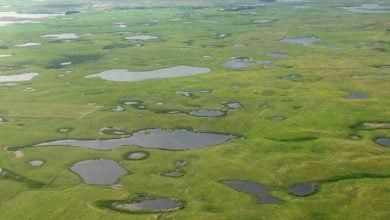As the residents of Haiti, Cuba, Louisiana and Texas begin the struggle to rebuild after a spate of devastating hurricanes, recent research confirms that global warming is causing more powerful hurricanes.
|
“As the seas warm, the ocean has more energy to convert to tropical cyclone wind,” wrote the authors of the paper.
The paper calculates that a 1? C (1.8? F) rise in ocean temperatures increases by 31 percent the number of cyclones categorized as strong.
There is already a body of research that links warmer seas with more intense cyclones, which are called hurricanes when they occur in the Atlantic.
The researchers looked at satellite data for the period between 1981 and 2006 in the Atlantic, Pacific, Indian Ocean and South Pacific storm basins. The data showed no increase in the overall number of storms; however, it did show a significant increase in wind speed among the most powerful storms. The increase was not seen in the South Pacific where, according to the researchers’ hypothesis, the already high ocean temperatures have led to a smaller relative change.
Other recent research indicates that the global warming trend is not simply a matter of natural fluctuation in world temperatures. The sharp increase during the past few decades is bigger than any other increase in the past 1,300 years. The report, published by the Proceedings of the National Academy of Sciences, refutes so-called climate change skeptics who claim rising temperatures are part of a natural cycle.
The study “establishes further evidence that the recent warming is not just part of a typical cycle,” according to climatologist Michael Mann, director of the Earth System Science Center at Pennsylvania State University.
“Of course, this alone doesn’t establish the cause of that warming—that it must be due to human influences,” Mann said. According to him, only human behavior—the production of gases from burning fossil fuels in particular—can explain the more recent world temperature increases.
The scientists researched data about world temperatures prior to the mid-19th century, when people first began recording temperatures. To learn about the climate in the past, they looked at corals, ice cores, and lake and cave sediments. In an earlier study, they had used tree rings to estimate temperatures with basically the same result. “We found we got more or less the same answer,” said Mann.
In other words, the study adds to the already large body of evidence that confirms global warming is a serious anomaly and not simply a natural variation in global temperatures. The real question is not whether climate change is real or not, but what we can do about the problems it has caused and will continue to cause.
Having a comprehensive hurricane preparation and response system that prioritizes human needs is a first step. Restoring long-destroyed natural barriers such as wetlands that minimized the impact of storms in hurricane-prone areas would be another. And of course, we need immediate action to drastically reduce the carbon emissions behind global warming. Other “natural disasters” such as more intense forest fires, floods and droughts have also been linked to rising global temperatures.
Ultimately, what the planet needs is sustainable development. As long as the quest for maximum profits trumps all else, this goal will remain out of reach. Capitalism is incapable of doing away with waste of natural resources to ensure that they’ll be available for future generations. A socialist economic system—one where private property is replaced by collective property and where decisions that impact the lives of billions are not made by a handful of profiteers—would lay the foundation for planned, sustainable development.







